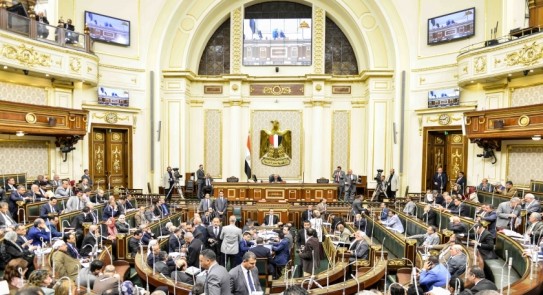Without warning, Dr. Khaled Abdel Ghaffar, Minister of Higher Education and Acting Minister of Health, dismissed Dr. Karim Salam from his position as Undersecretary of the Ministry of Health in Cairo, ending his assignment as Director of the Central Chamber of the Presidential Initiative to End Waiting Lists for Critical Surgery and Intervention Patients.
The dismissal decision was strange, as it came shortly after Salam took these positions, which made some speculate that it was part of Abdul Ghaffar’s plan to remove leaders in the Ministry of Health close to Minister Hala Zayed, who was referred to compulsory leave at the end of last October, on the pretext of “health conditions.” At the same time, press reports revealed that Salam’s dismissal came in retaliation for his preparation of a report on the lack of implementation of the presidential initiative to end waiting lists for patients needing critical surgery and intervention.
Dismissal is the default fate
An official source at the Ministry of Health revealed, in press statements, that Salam’s dismissal came against the background of reports he prepared before his departure, related to the results of the project to end patient waiting lists, noting that Salam had previously revealed the shortcomings of university hospitals affiliated with the Minister of Higher Education Khaled Abdel Ghaffar in completing surgical procedures for waiting list cases. He had also filed many complaints about policies introduced by managers of the project to end patient waiting lists.
According to the source, Salam prepared, at the request of the Prime Minister, a report containing all the challenges that hinder the completion of the initiative to end waiting lists for critical surgical patients, in which he revealed that there are 28,614 cases on waiting lists. The report stated that the medical sector suffers from a significant shortage in the workforce, and a lack of medical supplies to government hospitals, noting that the average monthly need for corneas is 335, compared to the supply of only 75 corneas last October, while waiting cases amounted to about 726, in addition to the lack of supplies of cardiac catheters, open heart surgeries and orthopedic surgeries.
The report pointed out that the lack of supplies was reflected in being able to perform operations, as well as on the percentage of participation of hospitals in the therapeutic medicine sector in important specialties such as open-heart surgery, tumor surgery, cerebral and artisanal catheterisation, and liver and kidney transplantation, where the number of cerebral catheterisation operations did not exceed 19 cases since its addition to the project. To date, there have been 42 cases of peripheral catheterisation only, and 283 open-heart cases in nearly three years, according to the report.
The report also revealed challenges in the participation rate of Health Insurance Authority hospitals in the specialties of cardiac catheterisation, open-heart surgery, pediatric neurosurgery, and micro-tumors (brain and neurosurgery in Egyptian children with an average of only nine cases per month). The report pointed to another challenge related to the percentage of achievement of university hospitals in the specialisations of open heart, neurosurgery, especially children, blood vessels and peripheral catheters, despite the capabilities and human cadres available in “higher education” hospitals, as well as compared to the absorptive capacities.
Salam called for several recommendations, including that higher education hospitals increase completion rates in line with the available capabilities and human cadres, while the recommendations concluded with a request directed to the financial and administrative affairs sector to establish a unified system for incentives for workers in the system of the national project to end waiting lists in hospitals affiliated with the Ministry of Health and Population to motivate them.
Despite the approval of Salam’s recommendations, Dr. Khaled Abdel Ghaffar, Minister of Higher Education and Acting Minister of Health, issued a decision to dismiss him from his posts instead of rewarding him for revealing a shortcoming. It appears that Abdel Ghaffar was offended by Salam’s revelations of negligence in the hospitals affiliated with the Ministry of Higher Education, which he has headed since 2017, which is an indirect condemnation of his negligence.
An approach that is not alien to the Sisi regime
This is not the first time an official has been dismissed after revealing the government’s failure or corruption, as what previously happened with Counselor Hisham Geneina, the former head of the Central Auditing Organisation, the most important supervisory body on the executive authority, after he revealed in press statements that the cost of corruption in state institutions reached 600 billion Egyptian pounds ($70 billion).
After three months of these statements, which sparked great controversy, Sisi took a decision to dismiss Geneina from his position, and instructed the State Security Prosecution to investigate him on charges of “spreading false news that would harm the Egyptian economy and disturb social peace and security,” which was followed by his referral to the court, a sentence of one year in prison with a suspended sentence and a fine of 20,000 Egyptian pounds.
After that, the Sisi regime continued to target Geneina. He is currently serving a five-year prison sentence for his support for Lieutenant-General Sami Anan, the former chief of staff of the Egyptian army, in the 2018 presidential elections, in which Sisi succeeded after eliminating all the candidates standing against him. Sisi’s issue is that they uncovered corruption and the news spread among the people (the first at the state level, the second at the level of Ministry of Health) which caused personal embarrassment to them.
The men of the Sisi regime hate the concepts of transparency, disclosure and accountability. The Minister of Higher Education and the Minister of Intelligence are equal in this. They want everything to be kept secret, so that they can go out and be proud of the results of their work and achievements without anyone knowing the truth.





Recent Comments